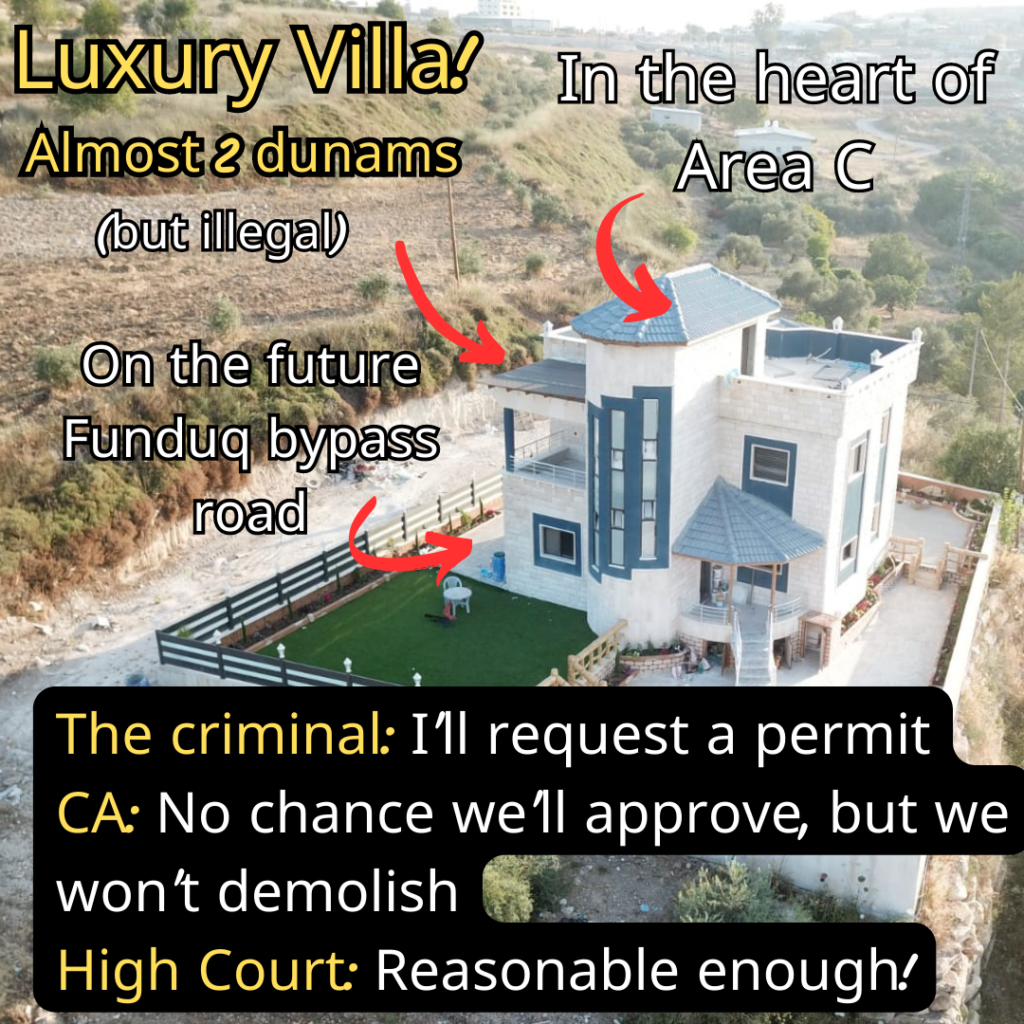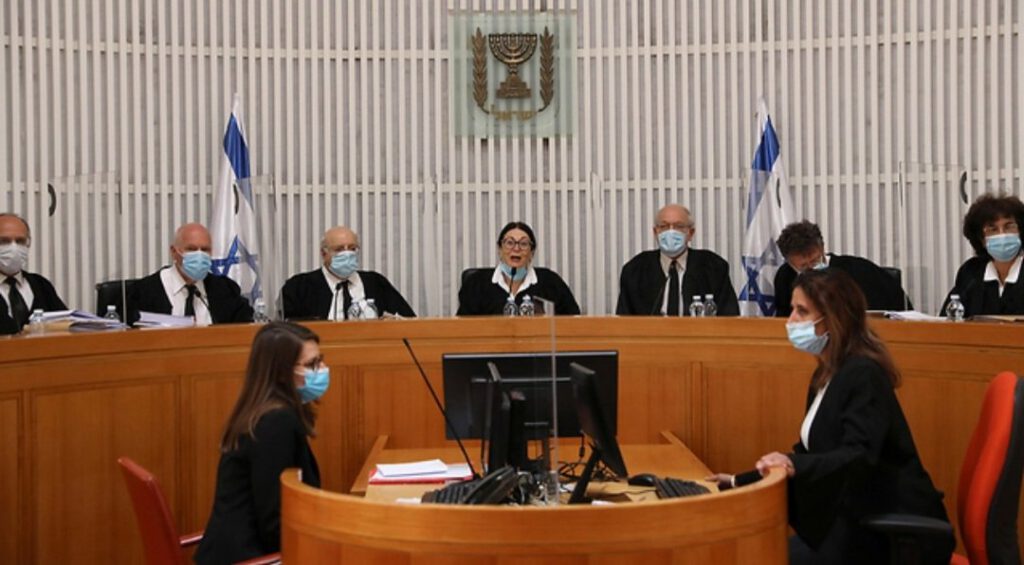Under a newly adopted law, the “reasonableness doctrine,” created by former Chief Justice Aharon Barak as a means of vastly expanding the power of Israel’s High Court to overrule policy choices made by officials, has been curtailed.
In what may come as a surprise to critics of the move in Israel and abroad, the sky has not fallen, and Israel’s judicial branch has not lost its independence. The new law simply restores limits upon the Supreme Court’s ability to strike down ministerial appointments or other decisions by elected officials, while not touching the Court’s jurisdiction regarding decisions taken by the non-political echelon – the sweet spot that preserves powers for the Court that are unique in the Western world, but restores to the people their ability to govern themselves democratically through elections.
Consider a recent petition brought by the Regavim Movement against a Civil Administration protocol that automatically suspends enforcement against illegal Arab-built structures. The Civil Administration is an arm of the Israeli defense apparatus that administers “Area C” of Judea and Samaria, the territory over which Israel exercises full jurisdiction under the Israel-PLO Oslo Accords.
Although subject to the supervision of the Minister of Defense, the Civil Administration enjoys substantial autonomy in setting policy, and the protocol in question was not formulated by the minister or his staff, nor by any preceding holder of this office; it was instituted and enforced by the Civil Administration alone.
In fact, Justice Groskopf noted in the decision, that although the amendment limiting the “reasonableness doctrine” came into effect some three weeks ago, this case focuses on policies instituted by the “professional echelon” (OC Central Command and Commander of the Civil Administration), and is therefore unaffected by the new law.
Some might argue that this passing comment, intended to provide justification for hearing the petition in the first place, is an important insight into the bigger picture of the level at which Israel’s governance in Judea and Samaria is conducted in practice; more on this below.
The particulars of the case involve a petition filed by Regavim last year regarding a “standard operating procedure” applied by the Civil Administration to illegal Arab-built structures in Area C.
The upshot has been an umbrella of legal protection that lasts for years on end. The appeals process, if it can be called a process, drags on interminably as the structures are built to completion, inhabited for years thereafter, and accepted as one more fact on the ground in the Battle for Area C. No such protection is afforded to illegal Jewish construction, which the High Court has ordered demolished even when its legal status is unclear or in the process of legalization.
This past May, when arguments were heard in the High Court of Justice, Regavim presented data that paints a very clear picture of the abuse of the system by Arab construction offenders: From 2018 to 2020, a whopping 1302 permit requests were submitted – and not a single one was approved.
These requests were for post-facto “whitewashing” of illegal structures that were already in various stages of completion, built, for example, in nature reserves, on archaeological sites, in active military firing zones, within the municipal lines of existing Jewish communities, on privately owned land, adjacent to major traffic arteries or on land slated for new roads, and other such locations.
Eight-hundred-and-one requests were rejected outright and another 501 are still pending. In that same time period, 479 appeals were filed, of which 475 were denied.
In other words, the overwhelming majority of requests and appeals were frivolous, baseless, utterly without merit – and were clearly nothing more than a means of protecting existing illegal structures that cannot and will not be granted legal status.
The stalling tactic of submitting a permit request followed by an appeal when the request is rejected, has effectively turned the system against itself and provided the legal cover for mass-scale annexation of the open spaces of Area C by the Palestinian Authority.
The state’s representatives argued that enforcement bodies have the authority to suspend enforcement against illegal structures according to priorities based on a variety of considerations. Additionally, the state’s attorney presented a very broad interpretation of the Jordanian law to justify the policy of suspending enforcement until all procedural and legal steps are exhausted.
Justice Groskopf noted that the government’s arguments were inconsistent, and Chief Justice Hayut criticized the government for failing to present accurate data regarding the number of permit requests and appeals: “The respondents are expected to periodically examine the policy they adopt in this context, and to formulate an opinion based on the data… in order to determine whether the data supports the policy they have instituted,” said the Chief Justice.
Nonetheless, the High Court found insufficient cause to intervene, agreeing that continued reliance on this policy “does not overstep the boundaries of reasonableness.” Regavim’s petition was rejected.

This gives us an opportunity to think about what is “reasonable” about current Israeli policy in Judea and Samaria, and what is “unreasonable.” Although the High Court found that the Civil Administration’s authority to implement its current policy is “not unreasonable,” its policy is bringing about unreasonable results.
On a purely legal level, the Civil Administration clearly has a mandate to formulate and implement enforcement policy, but this mandate is itself unreasonable. The Civil Administration is an arm of the military, and its primary objective is to maintain peace and quiet.
Unfortunately, this objective is all too often achieved through unreasonable means that are beyond the purview of military operations and go to the heart of politics, geopolitics, international relations, and Israel’s future. In the case of wholesale, open-ended suspension of enforcement, the price for avoiding confrontation with Arab construction offenders – and with the international community that is supporting this activity as a means of creating a de facto Palestinian state – is the sacrifice of Israel’s security, the decimation of Israeli governance, discrimination against Jews, and deprivation of their right to live in and develop Jewish communities in Area C.
The very expansive interpretation given by the Civil Administration to Jordanian law is itself unreasonable, even if it is “legal”: It protects, encourages, and rewards illegal construction; undermines governance and the rule of law; and enables de facto annexation of what is, at the very least, disputed territory that the State of Israel has been entrusted and empowered to protect – very unreasonable outcomes indeed.
It would be reasonable to require a less expansive interpretation and application of the Jordanian law. It would be no less reasonable to require the application of legal norms as they are applied throughout all other areas under Israeli jurisdiction.
It would certainly be no less reasonable to require the Civil Administration to uphold standards in the Arab sector that equal those for planning, construction, and environmental sustainability equal to those applied to the Jewish sector. Israel’s High Court of Justice has failed to grasp the magnitude and intensity of the battle for the open spaces of Area C that is being waged by the Palestinian Authority – and is being lost by the State of Israel. The Civil Administration has failed to defend Israel in that war. Neither the Civil Administration nor the High Court of Justice should be entrusted to provide solutions to these problems; the High Court’s decision in this case makes it clear that it does not intend to do so.
Regavim’s petition on this matter, as in so many others, was an attempt to force the Israeli government to act as any reasonable government should, and the decision that was handed down leaves the door wide open for the government to do so. The time has come for Israeli legislators to roll up their sleeves, wade into the muddy waters, and restore reasonableness to Civil Administration protocols. In other words, it’s time for the Israeli government to govern.
Related Posts
Ground-breaking verdict brings hope for justice in the Negev
Beer Sheva District Court instructs the government to remove the squatters of Al Zarnog: “The State cannot condone the violation of individual proprietary rights.” A decisively-worded verdict was recently handed down by Judge Chani Slotki of the Be’er Sheva District Court, in a petition demanding that enforcement procedures be taken against hundreds of Bedouin squatters […]
Building a vision for the Negev
Big news for the State of Israel: The government has outlined a historic and strategic plan that will restore governance and personal safety to the Negev. Last week, Prime Minister Netanyahu convened a meeting of the Ministerial Committee on Legalizing the Settlement, and the Economic Development, of the Bedouin Sector in the Negev to discuss […]









